9. Two Views of the West Side.
There is a pedigree here: the 1596 Shakespeare play Romeo and Juliet, the 1957 stage musical by Leonard Bernstein
and Arthur Laurents, the beloved 1961 movie by Jerome Robbins and Robert Wise, numerous stage revivals on Broadway and
elsewhere, and most recently the 2021 movie by Steven Spielberg and Tony Kushner. However, as there are no usable clips
of any stage productions available, we come down to comparing the two films—which is no hardship, since one is an icon
and the other a masterpiece.
In the first hour, we will look at scenes from the 1961 film in running order, though omitting many of the most famous
numbers to concentrate on moments that demonstrate the task of translating the Shakespeare plot into a stage musical,
and in turn shaping that into a movie. We look especially at the last third of the play, when a violent death raises
problems that Shakespeare addresses by melodramatic means that are not available to the modern writer.
The second hour is principally concerned with looking at how Spielberg and Kushner solve these same problems—though we end
with a riot of dance and color that is no problem at all! rb.
NOTE. This class assumes that you already know the story of Shakespeare's Romeo and Juliet.
If you need reminding, you will find synopses of various lengths here. This graphic, which will also be shown in class, summarizes the differences between the two works.
The script, videos, and images will be posted immediately after class.
Q AND A
Were the lyrics to "America" changed in the 2021 film?
David Weiss raised this with me after class, so I researched it. He is right, but the main changes occurred between the 1957 stage show and the
1961 movie, apparently because Rita Moreno, who is Puerto Rican, objected to the negative stereotypes of her island. So Sondheim wrote
a more positive version. For the most part, the 2021 movie follows the 1961 movie text, with only Anita's opening significantly changed, to
remove some remaining slurs. You can see the different sets of lyrics here. I would also
direct you to this interview with Tony Kushner in which
he discusses his role in the 2021 film generally, and advances the interesting theory that the four Jewish men who wrote the original musical
assumed that Puerto Rican immigrants were like Jewish ones, in not having anything good to say about their former countries. Finally, I would
recommend this
review of the 2021 movie by a British critic of Indian (ie. British colonial) descent; he repeats himself a bit, but it is quite
valid analysis of the show in post-colonial terms.
What other changes were made to "America"?
Between the two movies, there is a gigantic difference in mood. In 1961, number took place in a dark basement, with the Puerto Ricans all in
muted colora. In 2021, they burst out into the streets in an glorious explosion of scarlet and yellow. There is a
YouTube video intercutting the two versions side by side. The Spielberg/Peck version,
for me, is the highlight of the more recent movie, and one of the most exuberant scenes I can think of in movie musicals.
What about the casting choices?
I can't recall who raised this with me, but he had a point. Spielberg cast actors of Latino heritage in his 2021 film: Rachel Zegler,
the Maria, is Colombian on her mother's side; David Alvarez, the Bernardo, is Cuban-Canadian. But the producers of the 1961 film had no such
niceties: Natalie Wood is of Eastern European background; George Chakiris, the Bernardo, is of Greek stock; only Rita Moreno is from Puerto Rico.
Personally, I think the Tony is also miscast; Richard Beymer always felt uncomfortable doing handsome boy-next-door roles; he retired from acting
soon after, but took up a later career as a director.
VIDEO LINKS
The 1961 movie is available on YouTube complete at the first link below. All the other links,
however, are to separately-available clips; I have also included some well-known numbers that I did not show in
class, all of which are *asterisked.
The 2021 movie is not available free, but it may be rented for under $4.00. I strongly recommend
this, since the other links to free clips do not necessarily correspond to the sections I showed in class, and there is
nothing that shows the wonderful Tony Kushner dialogues. The one item that I would have shown if I could, and especially
recommend now, is the number "Cool" from late in the show, because it is typical of Spielberg's success in taking an
otherwise-throwaway number and making it actually advance the plot.
In the final section, you will find links to a variety of other clips, mainly of documentary interest.
There is a lot out there, so I have confined myself to the handful I recommend most highly:
- The Shakespeare sonnet scene played in class
- Some clips from the 1957 stage production, mainly too blurry to be useful
- Comments from the first-night audiences in 1957
- Interesting bunch of comments from Spielberg about his casting decisions in the 2021 movie
- The "Big Joel" blog mentioned in class; highly recommended, especially on "A boy like that"
- Detailed analysis of the music of the Dance at the Gym
- Mambo conducted by Gustavo Dudamel with young Latino players—exuberant and superb!
- Opening in concert, focusing on the drum-set player; fascinating insight into Bernstein's rhythm
| |
|
|
|
|
|
| IMAGES |
The thumbnails below cover the slides shown in class, though
there may be a few small discrepancies. Click the thumbnail to see a larger image.
Click on the right
or left of the larger picture to go forward or back, or outside it to close. |
 | |
 | |
 | |
 | |
 | |
 | |
 | |
 | |
 | |
 | |
 | |
 | |
 | |
 | |
 | |
 | |
 | |
 | |
 | |
 | |
 | |
Here are brief bios of the artists, composers, and writers considered in the class, listed in order of birth.
 |
William Shakespeare, 1564–1616. English poet and playwright.
With almost 40 plays, 154 sonnets, and many longer poems, Shakespeare dominates English literature of his time, and world literature for ever after. To attempt a thumbnail biography would be both unnecessary and impossible.
|
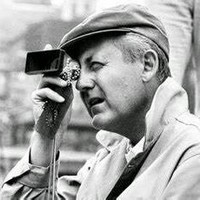 |
Robert Wise, 1914–2005. American director.
Born in Indiana, Wise came to Hollywood in 1933, and got his first Oscar nomination as editor of Citizen Kane in 1941. Turning to directing in the mid-1940s, he won Oscars for West Side Story and The Sound of Music in 1961 and 1965 respectively, although he also worked in most other genres.
|
 |
Arthur Laurents, 1917–2011. American writer and director.
Laurents, who was born Arthur Levene in NYC, began a varied career in radio, film, and theater after graduating from Cornell. For example, he was the screenwriter for Alfred Hitchcock's Rope (1948), book-writer for West Side Story (1957) and Gypsy (1959), and director of La Cage aux Folles (1983). He won two Tony Awards, a Golden Globe, and several Oscar nominations.
|
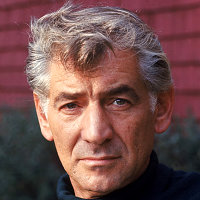 |
Leonard Bernstein, 1918–90. American conductor and composer.
Winning fame relatively young as conductor of the New York Philharmonic, Bernstein also reached wide audiences with his music lectures on television. His work as a composer ranges from Broadway musicals such as West Side Story (1957) through symphonies, operas, and his multi-media Mass (1971).
|
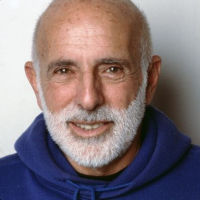 |
Jerome Robbins, 1918–98. American choreographer and director.
Beginning his career as a dancer and later choreographer with the American Ballet Theatre, Robbins later joined forces with Balanchine in the New York City Ballet. While he created numerous ballets in the classical tradition, his career on Broadway and in film is at least as important, including his work on West Side Story in both media.
|
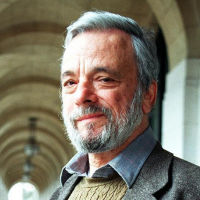 |
Stephen Sondheim, 1930–2021. American composer and lyricist.
A protégé of Oscar Hammerstein's, Sondheim made his Boadway debut in 1957 as lyricist for West Side Story, but he soon began his own string of musicals, writing the music as well as the words, including A Funny Thing Happened on the Way to the Forum (1962), A Little Night Music (1973), and Sweeney Todd (1979). Often dealing with non-traditional subjects, these and others largely redefined the Broadway in the later 20th century.
|
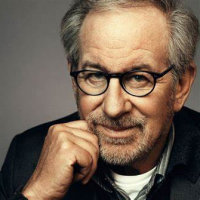 |
Steven Spielberg, 1946– . American director.
Born in Cinncinati, raised in Phoenix, attending film school in California, Spielberg is the winner of 3 Oscars, 4 Golden Globes, and the Presidential Medal of Freedom. His filmography virtually defines Hollywood for the past half-century, especially its more serious side; the following are merely samples: Jaws (1975), the Indiana Jones trilogy (1981–9), ET (1982), Schindler's List (1993), Saving Private Ryan (1998), Munich (2005), Lincoln (2012), and West Side Story (2021),
|
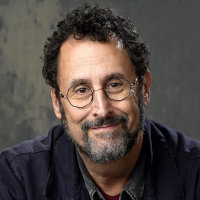 |
Tony Kushner, 1956– . American playwright.
The son of professional musicians in New York City, Kushner won both the Pulitzer and a Tony for his two-play sequence Angels in America (1993). While continuing to write plays, he has branched into other projects, such as the book and lyrics for Jeanine Tesori's 2003 musical Caroline, or Change and a series of screenplays for Steven Spielberg, including Munich (2005), Lincoln (2012), and West Side Story (2021).
|
 |
Justin Peck, 1987– . American choreographer.
Although he only started studying ballet in his teens, Peck was accepted by the NY City Ballet at 18 and was quickly promoted up the ranks to soloist. He made his first ballet for the company in 2012 and was appointed Resident Choreographer two years later. More recently, he has enjoyed a parallel career choreographing musicals, such as the Broadway revival of Carousel in 2018 and Steven Spielberg's film of West Side Story in 2021.
|






























